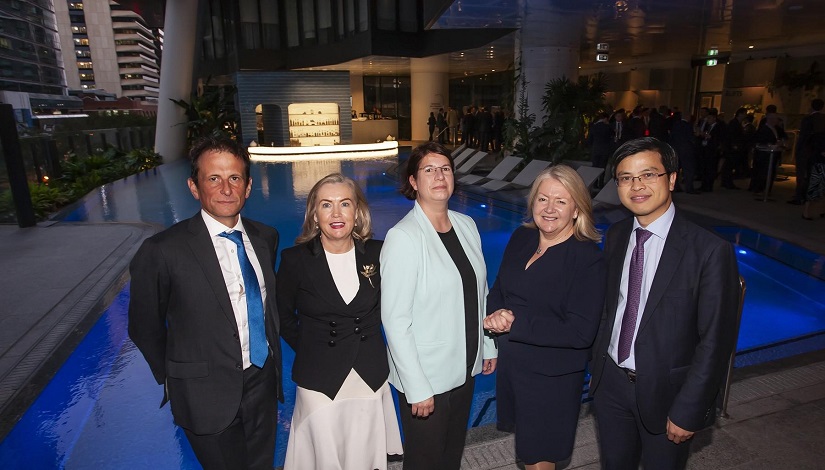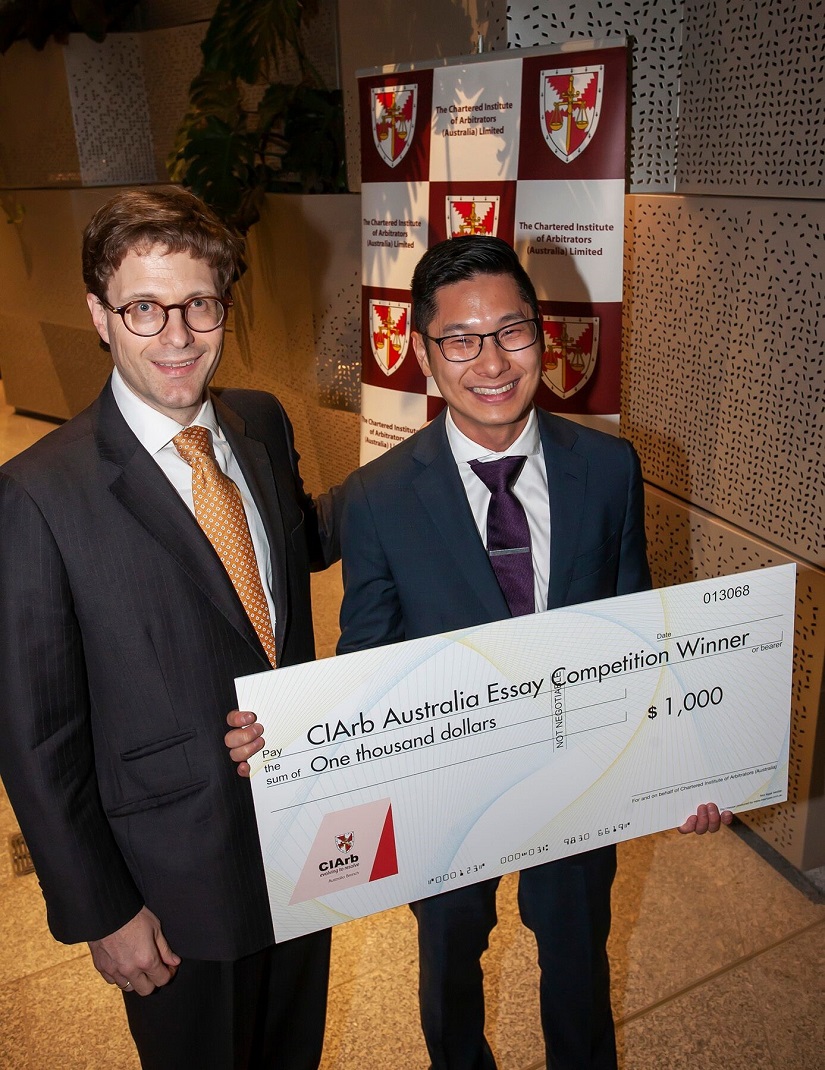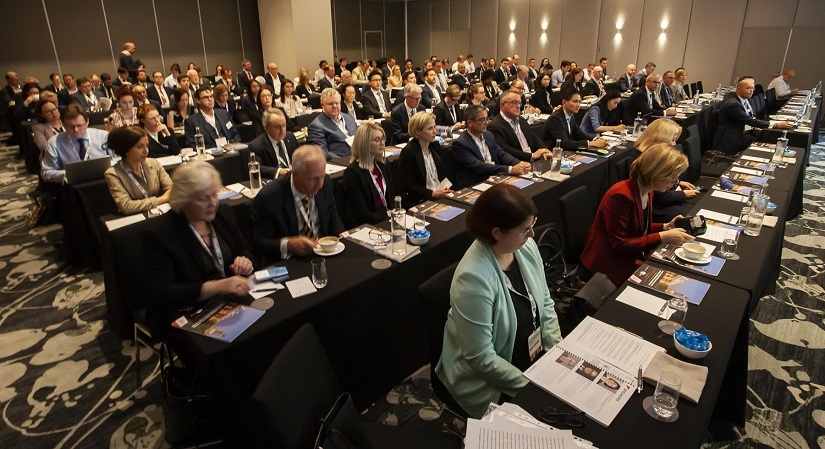CIArb News
Australian Arbitration Week 2019
25 Nov 2019
L – R: The Hon Chief Justice Catherine Holmes, Brenda Horrigan, President of ACICA, The Hon Justice Patrick Keane & Caroline Kenny QC, President of CIArb Australia
On 18 November 2019, arbitration practitioners from around the world convened at the Westin Brisbane to attend the 2019 International Arbitration Conference, organised by ACICA and CIArb Australia (https://www.ciarb.net.au/ or https://ciarb.org/our-network/australasia/australia/). The conference, which saw practitioners from 5 continents and 15 jurisdictions impart their knowledge and experience, also launched Australian Arbitration Week, in Brisbane for the first time. Australian Arbitration Week mirrors similar weeks in key arbitration jurisdictions around the world including Dubai, Paris, Hong Kong, Seoul and London. In her opening address the President of CIArb Australia, Caroline Kenny QC C.Arb FCIArb, noted that the conference had been supported by the High Court’s Justice Patrick Keane AC, who was himself a native of Brisbane, as well as the Queensland government and judiciary including Chief Justice Holmes, President of the Court of Appeal, Justice Walter Sofronoff and Solicitor-General of Queensland, Sandy Thompson QC. The conference which was a sold-out affair was called “Building Bridges - resolving disputes through international arbitration.” The conference featured a line up of arbitration luminaries including Paula Hodges QC, the President of the London Court of International Arbitration, Matthew Gearing QC, the Chair of the Hong Kong International Arbitration Centre, Chan Leng Sun SC, the deputy Chairman of the Singapore International Arbitration Centre and Dr Fuyong Chen, the Deputy Chair of the Beijing International Arbitration Centre.
In his keynote address the Honourable Justice Keane AC advocated for “quality control” of the arbitration process to ensure its success. His Honour said that the quality of decision-making is just as important to parties who have chosen arbitration as it is to those who have chosen litigation, and that competence and diligence should be the goal of every arbitrator. The speech alluded to the many Australian cases which had contributed to jurisprudence in international arbitration.
The first session of the day went around the globe, focusing on current trends in international arbitration in the Middle East and parts of Asia. Dubai-based Anne Hoffmann said that arbitration is fully accepted by users in the Middle East; the hotspot of arbitration being the UAE and specifically, Dubai. Meg Utterback, from King & Wood Malleson’s spoke to developments in China including the 2019 Framework Plan which permits foreign arbitral institutions to register in mainland China. Sheila Ahuja, of Allen & Overy Singapore said that a lack of reliability and consistency in the courts in Indonesia, India, Malaysia and Japan had made arbitration in those jurisdictions a strong choice. However, she identified hurdles in these countries. The Indonesian arbitration law does not adopt the Model Law. Recent amendments to India’s arbitration law are thought to be confused and India has only chosen to enforce arbitral awards from arbitrations with 59 (of the ~160) countries who are party to the New York Convention. Japan has some way to gain international reputation. And the Malaysian courts do not offer reliable or efficient judicial support for arbitration in that country.
The second session featured a conversation with Paula Hodges QC, led by Caroline Kenny QC. Ms Hodges spoke about a distinguishing feature of the LCIA Arbitration Rules being to ensure that counsel comply with certain ethical standards contained in the Annex to the LCIA Rules, which gives tribunals the power to investigate alleged violations of the standards and impose certain sanctions in relation to any such violation.
In Session Three, we heard about arbitration in the energy and resources industry. The session was chaired by Jeremy Quan-Sing from Allen’s Perth office who revealed that a WA Arbitration Initiative which looked at the nature of arbitration activity with a WA connection in the 2017/2018 financial year, concluded that 75% of all reported arbitrations related to either the construction or oil & gas and mining industries. Georgia Quick, from Ashurst Brisbane spoke about arbitration in the renewables sector and said that arbitration needs to stay “fresh and relevant”. Perth-based Kanaga Dharmananda QC raised interesting points in the context of expert evidence.
Session Four focused on China’s One Belt, One Road initiative. This session was chaired by Chan Leng Sun SC. Dr Fuyong Chen spoke about China’s International Commercial Courts, which has two branches: one in Shenzhen to deal with disputes arising out of the Belt & Road maritime road; and one in Xi’an to deal with disputes in relation to the overland Belt. Olga Boltenko from Fangda Partners Hong Kong spoke about China’s treaty policy and the proliferation of dispute resolution centres.
After lunch there were dispute-specific panels on Intellectual Property and Mergers & Acquisitions. Professor Jennifer Lightowlers, Dean, of Deakin Law School (two time winner of the prestigious Vis Moot in Vienna) chaired a panel on the arbitration of IP disputes. Cologne-based Dr Rouven Bodenheimer said there was room for the infringement of IP rights to be the subject of a dispute under an investment treaty. Hong Kong’s Winnie Tam SC explained that Hong Kong has enacted legislation dealing with the arbitrability of IP disputes. The next panel saw an interesting session speaking to many different issues in the context of arbitration of Mergers & Acquisitions deals.

L – R: Matthew Gearing QC, Chairperson of the Hong Kong International Arbitration Centre, Caroline Kenny QC, President of CIArb Australia, Brenda Horrigan, President of ACICA, Paula Hodges QC, President of the London Court of International Arbitration, Dr Fuyong Chen, Deputy Secretary-General of Beijing International Arbitration Centre
Andrew McDougall, from White & Case in Paris offered his “top 3” tips for drafting an arbitration agreement. First, pre-arbitral steps should be crystal clear. Secondly, time limits should be reasonable and achievable. Thirdly, the arbitration agreement should include a proper law of the arbitration agreement. Singapore-based Paul Sandosham from Clifford Chance cautioned against choosing one institution to administer another institution’s arbitration rules.
The next session concerned construction & infrastructure disputes, chaired by Sandy Thompson QC. Stephen Hibbert treated the audience to an overview of the Qatar rail – Doha Metro, complete with a short video. Mr Hibbert also shared with us a rather novel feature of an arbitration agreement in that Project which provided that any arbitration would be delayed until the end of the Project, even if the contract was terminated. Frances Williams from Corrs Brisbane considered stop-clock arbitrations to be a worthy process to cut through the inefficiencies of arbitration.
The final session of the day concerned the appointment of arbitrators from an institutional and a corporate perspective. The session was chaired by Professor Doug Jones AO C.Arb FCIArb. Matthew Gearing QC demonstrated that the statistics show that institutions are driving gender/age/racial diversity more than the parties, and that the LCIA, in particular, is leading the charge. The corporate perspective was given by Scheherazade Walter. Ms Walter explained the apparent reluctance on the part of parties: the client is interested in this arbitration. It is not interested in furthering the cause of diversity for the good of arbitration more generally.
After the conference the delegates headed pool-side for a cocktail networking reception. The evening ended with a presentation by Queensland Convenor, Dr Shane Monks, of the prize to Jay Tseng who won the CIArb Australia Essay Writing competition.

Dr. Shane Monks, CIArb Australia National Councillor and Jay Tseng, 2019 CIArb Australia Essay Competition Winner
The rest of Arbitration Week was packed with events making this first arbitration week in Brisbane the most well attended one to date.

12 Apr 2024
Significant progress on Advisory Centre for International Investment Law at UNCITRALIn 2017, UNCITRAL Working Group III (WGIII) was launched and was tasked with working on procedural reform of the investor state dispute settlement (ISDS) system. From 1-5 April 2024, Ciarb participated in the 48th session of WGIII in its capacity as an observer delegate.
12 Apr 2024
A promising future: Strengthening mediation through diversityWe speak to mediator and Imam Ibrahim Hussain MCIArb about mediation’s bright future, and why diversity strengthens mediation.
12 Apr 2024
RIDW24: Construction Arbitration Trends and Key TakeawaysCristen Bauer, Ciarb's Head of Policy, highlights a few key takeaways from the discussions at Riyadh International Disputes Week 24 (RIDW24)